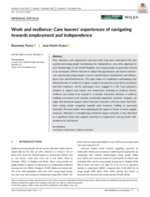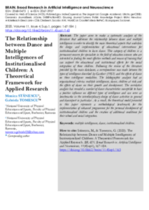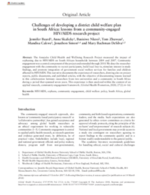Jennifer Beard, Anne Skalicky, Busisiwe Nkosi, Tom Zhuwau, Mandisa Cakwe, Jonathon Simon, and Mary Bachman DeSilva - Global Health Promotion
The Amajuba Child Health and Wellbeing Research Project measured the impact of orphaning due to HIV/AIDS on South African households between 2004 and 2007. Community engagement was a central component of the project and extended through 2010. This article describes researcher engagement with the community to recruit participants, build local buy-in, stimulate interest in study findings, and promote integration of government social welfare services for families and children affected by HIV/AIDS.




